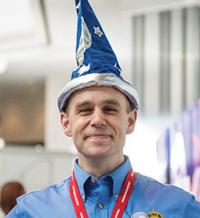One Interaction at a Time
Winter
2019
Letter
One Interaction at a Time
Brad R. Conrad, Director of SPS and Sigma Pi Sigma
However, it wasn’t just early morning homework set scrambles that got me through undergrad. It was selling pizza1 so we could buy a coffeemaker and new soda fridge for the SPS lounge. It was having (more or less) the entire department contact me after my father passed away, and it was knowing that none of us went to bed until we all finished our senior research PowerPoints. We ran tutoring sessions for freshmen and attended graduating seniors’ cap and gown ceremonies when their parents couldn’t come. While excellence in physics is important, fellowship and service are the hallmarks of some of the best department groups, and that’s highlighted when we come together at every ΣΠΣ-supported Physics Congress.
The Physics Congress, or PhysCon, began as a national convention designed to bring together the departments and students who wanted to support each other’s successes.2 We honor that legacy to this day by continuing to host PhysCon. While many things happen at a Physics Congress, one of the most important is the formation or extension of your physics community. Students and faculty from across the United States (and beyond) come together to discuss shared issues, work on societal problems, and learn about the broader community of which they are members. PhysCon strives to help students develop a sense of fellowship through not just a shared experience (awesome talks and breakouts), but by having people learn and work together. This emulates what happens at the department and, more importantly, the student level. While the professional development may be helpful, the connections and memories you make will last a lifetime. PhysCon works to develop your extended physics family and guide the next generation of physical scientists.
In college, I nearly changed my major. I didn’t because I found a home and—more importantly—a family in SPS. That was a few years ago now, but when I travel to physics departments, I get to see how SPS is still changing lives, one interaction at a time. I was recently at the University of Tampa to work with them on their newly formed chapter and was pleasantly surprised to see their chapter advertising itself as a “physics family” on fliers. I spent the afternoon with the chapter, working on homework, physics trivia,3 and finding the nearest open coffee shop… It felt like home. When I was at Gettysburg College4 this fall, we talked about how to capture the best pictures at the observatory with a cell phone and how we could make sure incoming freshmen felt welcome in the department. While these chapters are about 1000 miles apart, they share common experiences. It’s these experiences that connect us, and we often don’t even realize it until we come together. This is why PhysCon is so special… It’s like meeting long-lost friends you never knew you had and finally having a room full of people who get you.
One of the lasting impacts of Sigma Pi Sigma (ΣΠΣ) is that, in the United States, most physics and astronomy departments have a club, group, or cohort that students can make all their own (other regions of the world are set up differently).5,6 While ΣΠΣ, the physics honor society, helped form the Society of Physics Students 50 years ago, the core reasons for ΣΠΣ’s existence haven’t changed in almost 100 years: It’s not easy being a physics student, and we need to be there for each other.
When I tell people about what I do, a response that regularly comes up (mostly from non-physics/astronomy types) is, “Why is SPS special?” If you ever ask me, I’ll probably have one of two answers for you. First, it’s one big, emergent family. And second, we change lives, one interaction at a time. PhysCon can help you along your career path, and just might change your or someone else’s life.
Robertson, Physics and Pizza: Joining a Global Community of Scientists, (2017) https://www.spsnational.org/the-sps-observer/fall/2017/physics-and-pizza....
2. P. Dixon, The History of Sigma Pi Sigma, (1996)
https://www.sigmapisigma.org/sigmapisigma/about/history.
3. https://www.spsnational.org/programs/outreach/physics-jeopardy.
4. http://www.gettysburg.edu/academics/physics/student-opportunities/society-of-physics-students.dot.
5. A. Landcastle, Get Involved in the International Association of Physics Students, (2015) https://www.spsnational.org/the-sps-observer/fall/2015/get-involved-international-association-physics-students.
6. S. Borer, International Peers and Where to Find Them:
My Experiences at 2018 ICPS, (2018) https://www.spsnational.org/the-sps-observer/fall/2018/international-peers-and-where-find-them-my-experiences-2018-icps.

